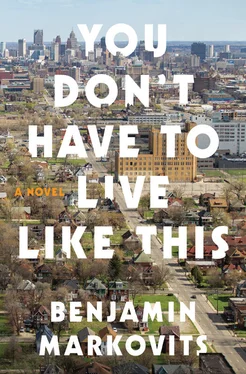“What do you want me to do,” I said. “You need to increase the police presence.”
“That’s not a solution. They have enough to do.”
“Then hire a security firm.”
“For five square miles? This has to work because it works, because people want you there.”
“I don’t think they want us there.”
We ran on silently for a few minutes, or almost silently — puffing a little and pounding our feet in the grass. “It doesn’t matter what anybody wants,” Robert said eventually. “No checkpoints.”
“Well, tell that to Eddie Blyleven.”
“I will.”
“He’ll tell you what I’ve been telling you, that you have to do something. So what are you going to do?”
“There are things we can try with the police we already have. I’ll talk to the commissioner about stop-and-frisk.”
“That’s another way of pissing people off,” I said.
When we got back to the house Robert had an email waiting for him that put him in a good mood. He checked his phone as soon as we walked through the door, and after that the atmosphere lightened a little.
“What is it?” I said.
“Nothing yet. I’ll let you know.”
His mother was staying with him — she came in at this point and we all sat down to breakfast in the kitchen. The last time I’d seen her she was wearing a boot cast. This time she had on a pair of house slippers and skinny jeans and a plain collared shirt, open-necked. She was one of those mothers who expresses affection for her son by flirting with his friends. But she hung on Robert’s neck, too; she touched him a lot. Maybe she had changed a little, maybe she was needier, and wanted to talk more.
Robert seemed to put up with her. His wife and baby boy were still in New York. Peggy, he said, had a circle of friends now, of other mothers; she was having a good time. Anyway, she was a New York girl, by birth and education and inclination, it wasn’t easy dragging her out of the city.
Mrs. James said, “I wish she’d come up to the house more. Whenever she wants to. I don’t even need to be around — I’ll clear out. But it’s good for a boy to get a little country air.”
“What have I just been saying,” Robert said. “There’s air in New York.”
“You should come, too,” she said to me. “Just send me an email. Whenever you want to get away. You and Walter.”
“It’s only thirteen hours in the car,” Robert said.
“Where’s Beatrice?” I asked at one point.
“I don’t know. In her room.”
“She’s gone to see Franklin about something,” Mrs. James said. “She’s back for lunch.”
Something about the way she said it made me sit up. They had known each other a long time — fifteen years. Ever since Robert brought Beatrice up sophomore year in college, to their house in New Hampshire, to meet his parents. Longer than she could have known Peggy, who was probably only in junior high at the time. But I guess mothers learn to put up with their son’s changing relations.
They both had flights to catch in the morning, and Robert excused himself to make another call. This left me alone with Mrs. James. She refilled my cup from the pot sitting under the coffeemaker.
“Robert puts himself under too much pressure,” she told me. “He never says anything, he never complains. But if this thing works out it will be big news. So he tells me. It will open a lot of doors. Poor kid,” she said. “It’s a funny thing how ambition creeps up on you. When he was a boy all he ever wanted to do was help me in the kitchen. I used to stand him on a chair by the counter with a wooden spoon. I let him stir the mix when I was making cakes. And now the president sends him texts. It’s wonderful, I’m very proud, but I can’t always take everything as seriously as he wants me to. Peggy’s very patient with him, she’s very good, but it’s not easy having a small kid either. I don’t care how rich you are. Their place in New York is spacious for New York, but I don’t want to get in their hair. We’re called mothers-in-law for a reason. So I came out here. He feels his duty to me, too. And I get to see Beatrice.”
I didn’t know whether to kiss her on my way out, so I didn’t do anything. She said, “Look after each other.”
Robert walked me to the electric gate. I was wearing one of his college sweatshirts, because it was cool out and my sweat had dried. “Listen, what are you doing for dinner?” he said. “Because I’ve got an extra ticket for this thing. Some conference on educational reform. Beatrice doesn’t want to go.”
So I saw him again that night, though we didn’t talk much. I met a lot of rich men, guys from the Big Three, and representatives from the mayor’s office, and other people who had flown in especially from DC. There’s a whole education reform mafia, businessmen who want to put their money into something. Detroit is like ground zero for education. Robert loaned me a jacket and tie, there was champagne served in the lobby of the Westin Hotel, and afterwards a three-course meal cooked up by the head chef of the Rattlesnake Club. While dessert was going around, Robert and I ended up at the bar together, with drink orders, and I said to him, “So she doesn’t mind, you staying here with Beatrice.”
“She minds.”
“Because most girls would find that weird, and with your mother as well.”
“She’s jealous of that, too.”
“So what do you do about it?”
“Well,” he said, “I take it into account.”
At that point his drinks arrived and I didn’t see him again for the rest of the night. It was a relief to get back to Johanna Street, where I could knock on Walter’s door and take off my tie, feeling drunk, and make fun of the whole scene.
Afew days later Walter told me that Susie was pregnant. They hadn’t exactly planned it — they expected the whole conception business to take more than “a couple of shots.” And she was only eight weeks in. Susie didn’t want to tell anybody until twelve, so I shouldn’t say anything to her about it. But he wanted me to know — he was very happy.
Maybe this is why Susie started to resent how often I stopped by. It was also a problem that she didn’t like Astrid, who she thought of as a phony person. I didn’t totally disagree with her, but there was something prim and old-maidish about Susie that riled me, given how she met Walter. She thought Astrid was an exhibitionist and a user of people and, I don’t know what else, a slut. Whereas Astrid had nothing but warm feelings for Walter and Susie and didn’t make any judgment about their relationship, not once, not in my presence, not even when we tried to talk each other to sleep, making the small talk of lovers in bed, which is often petty and hypercritical.
It turns out that knowing secrets about people makes them dislikable. I couldn’t help noticing the slight extra gentleness in Susie’s voice, and the way she sat down next to Walter on the couch when we watched TV. She and Walter used to go jogging together several times a week, and they kept that up, but I heard her once saying, coming up the steps, “I don’t know what it is, but I get so tired these days.” Even though she was only talking to Walter. This is the kind of thing that got on my nerves.
Not that I dislike kids. Tony and Cris sometimes came around with Michael, and Cris was starting to show. (Susie asked her a lot of questions about it.) And sometimes I even babysat for them, which probably means I did it twice. But I liked Michael. He called me Zio, and I used to hold him by his feet over my shoulders and pretend to look for him. “Where are you?” I said. “Behind you,” he said. So I’d turn around and get pretend-annoyed. I thought you said you were behind me, and so on. But I worried about Walter. I thought he was a very likable drifter, but when you drift you don’t want to accumulate too much stuff. And I felt jealous of his relationship with Susie.
Читать дальше












